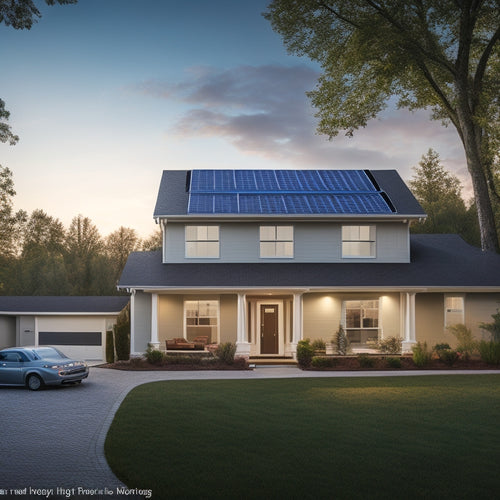
Home Back up Battery
Share
You've invested in a home backup battery, ensuring your essential appliances, like refrigerators and medical equipment, stay operational during grid failures, providing energy independence and peace of mind during outages. This investment also prevents food spoilage, electronic damage, and data loss, while maintaining connectivity to critical systems. To maximize your battery's performance, you'll want to examine factors like power load and wattage calculation, deep cycle battery technology, and low self-discharge rates. By understanding these details, you'll be able to optimize your battery's efficiency and reliability - and there's more to investigate to get the most out of your setup.
The Essentials
- Home backup batteries provide energy independence and peace of mind during grid failures, keeping essential appliances operational.
- They protect devices from data loss and equipment damage, ensuring business continuity and operational integrity.
- Deep cycle batteries deliver steady energy flow over extended periods, with high-performance lithium-ion batteries offering longer cycle life.
- Calculating total power load requirements ensures battery compatibility with devices, considering energy storage goals and device wattage.
- Prioritizing batteries with low self-discharge rates and long cycle life enhances reliability during outages, allowing for consistent performance and freedom from grid dependence.
Reliable Power During Outages
When the grid goes down, you need a reliable source of power to keep your essential appliances running.
With a home backup battery, you'll have power when you need it, ensuring your lights stay on, your fridge stays cold, and your communication devices stay charged.
By investing in a Renewable Energy System, you can safeguard your family's comfort and well-being during outages, and also prevent costly losses due to food spoilage and damage to electronics.
Power When You Need
Three key considerations come into play when selecting a home backup battery: reliability, capacity, and response time. You need a system that can provide reliable power during outages, ensuring your home safety and energy independence.
A reliable system means your battery will kick in seamlessly when the grid fails, keeping your lights on and your appliances running. With a Solar Power Backup system, you can say goodbye to the inconvenience of lost productivity, spoiled food, and compromised safety Reliable Electricity Supply. Additionally, this innovative product solves three major problems for homeowners like you.
Capacity is vital, as it determines how long your battery will last during an outage. You'll want to choose a battery with enough capacity to power your essential appliances, such as your refrigerator, medical equipment, or sump pump.
Calculate your energy needs and select a battery that can meet them.
Response time is also significant. You don't want to be left in the dark, waiting for your battery to kick in. Look for a system with a fast response time, ensuring a seamless shift from grid power to backup power.
With a home backup battery, you'll have peace of mind knowing you're prepared for the next outage, and you'll enjoy the freedom that comes with energy independence.
Stay Connected Always
During extended outages, staying connected to critical systems and appliances is essential, and a reliable home backup battery guarantees you do just that. You can't afford to be disconnected from the world when you need it most.
With a home backup battery, you'll enjoy uninterrupted service, making certain your wireless connectivity remains stable and secure. Furthermore, it protects sensitive electronics, such as computers and televisions, from damaging power surges and data loss Home Energy Storage, providing homeowners with peace of mind and saving them from costly repair or replacement expenses. This means you can stay informed, work remotely, and communicate with loved ones without interruption.
A reliable home backup battery guarantees your critical systems, such as security cameras, alarm systems, and medical equipment, continue to function seamlessly. You'll have peace of mind knowing your home remains safe and secure, even when the grid is down.
Additionally, a home backup battery provides a stable power supply for your Wi-Fi router, making certain you stay connected to the internet and can access critical information.
Longer Device Lifespan Guaranteed
You'll appreciate the extended power backup that comes with a home backup battery, which guarantees your devices continue to function during prolonged outages.
This capability safeguards your devices from the stress of frequent power fluctuations, which can greatly shorten their lifespan.
With a reliable power solution like a whole house battery backup, you can enjoy uninterrupted power supply and reduce the risk of device damage.
Extended Power Backup
Reliability is the cornerstone of any home backup battery system, and extended power backup is a critical aspect of it. You want a system that can provide power consistently, even when the grid goes down.
When choosing a home backup battery, consider the backup duration you need. Do you need a few hours of backup power or several days? This will help you determine the right size of the battery and the type of system you require.
To guarantee extended power backup, it's crucial to follow proper battery maintenance tips. This includes monitoring the battery's state of charge, keeping it at room temperature, and avoiding deep discharging.
You should also compare different backup systems to find the one that best suits your needs. Look for systems with high-depth-of-discharge ratings, as they can provide more power backup per cycle.
Additionally, consider the system's scalability and flexibility to accommodate your growing energy needs. By selecting the right system and following proper maintenance tips, you can enjoy extended power backup and the freedom that comes with it.
Power Outage Protection
How vulnerable are your devices to power outages? Without a reliable backup system, you risk data loss, equipment damage, and extended downtime. A home backup battery guarantees your devices remain operational during emergency situations, safeguarding your digital life.
When the grid goes down, your backup battery kicks in, providing a seamless shift to alternative power. This not only assures business continuity but also prolongs the lifespan of your devices. By shielding them from sudden power surges and dips, you reduce the risk of component failure and extend their operational life.
Proper battery maintenance is vital for peak performance during emergency situations. Regularly check your battery's state of charge, voltage, and temperature to verify it's ready when you need it.
A well-maintained battery is essential for effective emergency preparedness, providing peace of mind and protecting your devices from the unpredictability of power outages. By investing in a reliable home backup battery, you're taking a proactive step towards securing your digital freedom and minimizing downtime.
Deep Cycle Battery Technology
You're likely aware that deep cycle batteries are designed to provide a steady flow of energy over an extended period.
When selecting a deep cycle battery for your home backup system, you'll want to take into account the cycle life expectancy, which refers to the number of charge and discharge cycles the battery can handle before its capacity starts to degrade.
For instance, a high-performance battery like a lithium ion battery can provide a longer cycle life and higher charge efficiency.
Additionally, you'll need to evaluate the battery's charge efficiency, as this will impact how much energy is wasted during the charging process.
Cycle Life Expectancy
Cycle Life Expectancy, an essential aspect of deep cycle battery technology, revolves around the number of charge and discharge cycles a battery can withstand before its capacity dwindles.
As you consider investing in a home backup battery, understanding cycle life expectancy is important to guarantee you get the most out of your investment.
A deep cycle battery's cycle life expectancy is directly influenced by your battery maintenance and charging practices. You'll want to follow the manufacturer's guidelines for charging and discharging to prevent premature wear.
Proper battery maintenance, such as monitoring temperature, state of charge, and electrolyte levels, also plays a significant role in extending the battery's lifespan.
By doing so, you can expect a deep cycle battery to last for 5-15 years, with some high-quality batteries offering up to 20-30 years of service.
With proper care, your home backup battery will provide you with the freedom and security you need during power outages.
Battery Charge Efficiency
As you investigate the world of deep cycle batteries for your home backup system, understanding the intricacies of battery performance becomes vital.
One important aspect to grasp is battery charge efficiency, which greatly impacts the overall performance of your system.
Battery charge efficiency refers to the percentage of energy stored in the battery compared to the energy input during charging. A higher efficiency rating means the battery stores more energy, resulting in longer backup times and reduced energy waste.
To optimize battery charge efficiency, it's essential to implement energy efficiency techniques, such as minimizing charging voltage and temperature extremes. Additionally, adhering to proper battery maintenance tips, like ensuring correct charging and discharging rates, can also enhance efficiency.
By doing so, you'll maximize your battery's potential, reduce energy losses, and enjoy a more reliable home backup system.
Check Your Wattage Requirements
You'll need to calculate your power load requirements to guarantee your home backup battery can handle the devices you want to power during an outage.
When considering your power needs, it's crucial to think about your energy storage goals, whether that's solving power outages or reducing your utility bills.
To do this, you'll need to check the wattage of each device, from lights and laptops to refrigerators and medical equipment.
Accurately determining your total wattage needs will help you choose the right battery size and configuration for your specific situation.
Power Load Calculation
A significant step in selecting the right home backup battery is determining your power load requirements. This involves calculating the total wattage of the appliances and devices you want to power during an outage. Accurate battery sizing is essential to guarantee you have sufficient energy to support your needs.
To calculate your power load, start by identifying the devices you want to power, their wattage, and the number of hours you need to power them. You can use the following table as a guide:
| Device | Wattage | Hours of Use |
|---|---|---|
| Refrigerator | 150W | 8 |
| Lights (5) | 10W each | 12 |
| Laptop | 65W | 4 |
| Medical Equipment | 250W | 24 |
Device Wattage Check
Five essential devices have been identified for backup power in the previous step: refrigerator, lights, laptop, and medical equipment.
Now, it's vital to determine the wattage requirements of each device to guarantee you choose a compatible home backup battery.
Start by checking the device labels or manufacturer specifications for wattage measurement. You'll need to know the maximum power draw of each device in watts (W). For example, your refrigerator might require 150W, while your laptop might need 65W.
Make a list of the wattage requirements for each device to calculate the total power load.
Verify device compatibility by checking the maximum surge capacity and continuous power rating of your home backup battery. Confirm the battery can handle the total power load of your essential devices during an outage.
A battery with a higher surge capacity can accommodate devices with high startup power requirements, like refrigerators and air conditioners.
Low Self-Discharge Rate
When you're shopping for a home backup battery, you'll want to prioritize a low self-discharge rate to guarantee your battery remains charged when you need it most.
A low self-discharge rate means your battery will retain its charge over time, even when not in use.
This is especially important for a home backup battery, as it directly impacts the battery's overall long cycle life.
Long Cycle Life
Twenty-five hundred charge cycles or more - that's what you can expect from a high-quality home backup battery with a long cycle life. This means you'll get years of reliable performance, even with frequent charging and discharging.
A long cycle life is critical for a home backup battery, as it directly impacts your freedom from grid dependence.
You'll want to prioritize battery maintenance to guarantee peak performance. Regular checks and maintenance tasks will help prevent degradation and extend the life of your battery.
Performance optimization is key, and a long cycle life enables you to fine-tune your setup for maximum efficiency.
With a high-quality home backup battery, you can rest easy that your system will perform consistently, even during extended power outages.
This reliability translates to peace of mind, knowing that your home and family are protected from the unpredictability of the grid.
Frequently Asked Questions
Can Home Backup Batteries Be Installed Outdoors?
You're wondering if outdoor installation is possible; the answer is yes, but you'll need a weather-resistant design, ensuring the battery can withstand harsh conditions, and comply with local building codes and regulations for safe outdoor operation.
Do I Need a Professional for Installation?
When considering installation, you'll weigh DIY convenience against the benefits of professional knowledge; while you can handle it yourself, hiring a pro offers warranties, compliance guarantees, and optimized performance, ultimately ensuring your system operates safely and efficiently.
Can I Use a Home Backup Battery for Camping?
When camping, you're seeking freedom from grid constraints. You can utilize camping power with a battery designed for off-grid excursions, considering its capacity to meet your energy needs, but it's crucial to assess your power requirements before making a purchase.
Are Home Backup Batteries Environmentally Friendly?
Are you tired of sacrificing the planet for power? Fortunately, you're choosing sustainable energy sources, like home backup batteries, which offer significant sustainability benefits and energy efficiency, reducing your carbon footprint and granting you freedom from fossil fuels.
Can I Charge My Battery With Solar Panels?
You can utilize solar power to charge your battery, ensuring energy independence. Look for solar panel compatibility and optimize battery charging efficiency by selecting a charger with maximum power point tracking (MPPT) to minimize energy losses.
Final Thoughts
As you're preparing for the next power outage, it's not a coincidence that you're considering a home back up battery. It's a deliberate move to secure reliable power during outages, and it's a decision that will assure a longer lifespan for your devices. With deep cycle battery technology, you can rest assured that your appliances will keep running. And when the lights do come back on, our battery's low self-discharge rate means it'll be ready to go again. You're making a smart investment - and it's about time.
Related Posts
-

Is Switching to Green Energy Solutions Easy
Switching to green energy solutions isn't just easy; it's also beneficial. You can greatly cut utility costs and enjo...
-

Cost of Solar With Battery Backup
You're investing in a solar panel system with battery backup to guarantee reliable power during outages. The cost of ...
-

Commercial Solar Energy
As you consider powering your business with commercial solar energy, you'll uncover it offers a triple benefit: signi...


